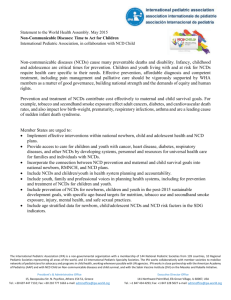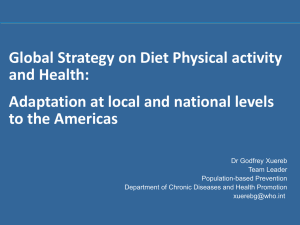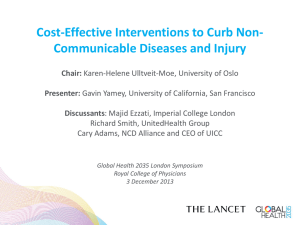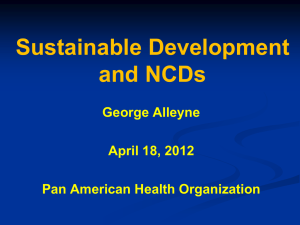First Global Ministerial Conference on Healthy Lifestyles and Noncommunicable Disease Control
advertisement
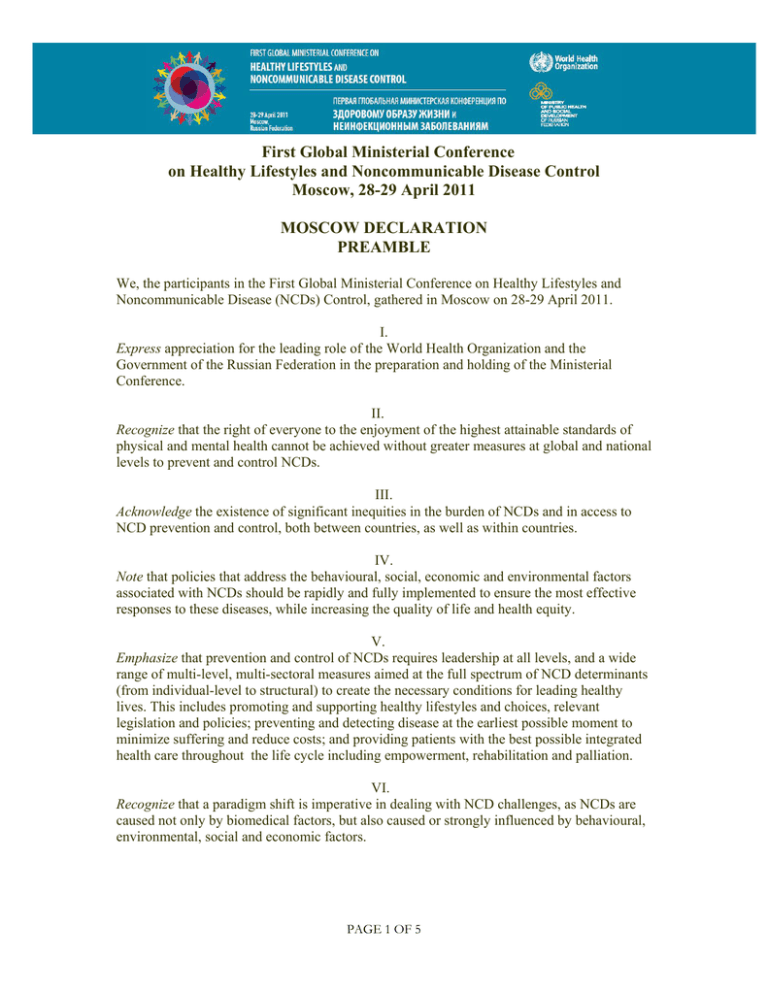
First Global Ministerial Conference on Healthy Lifestyles and Noncommunicable Disease Control Moscow, 28-29 April 2011 MOSCOW DECLARATION PREAMBLE We, the participants in the First Global Ministerial Conference on Healthy Lifestyles and Noncommunicable Disease (NCDs) Control, gathered in Moscow on 28-29 April 2011. I. Express appreciation for the leading role of the World Health Organization and the Government of the Russian Federation in the preparation and holding of the Ministerial Conference. II. Recognize that the right of everyone to the enjoyment of the highest attainable standards of physical and mental health cannot be achieved without greater measures at global and national levels to prevent and control NCDs. III. Acknowledge the existence of significant inequities in the burden of NCDs and in access to NCD prevention and control, both between countries, as well as within countries. IV. Note that policies that address the behavioural, social, economic and environmental factors associated with NCDs should be rapidly and fully implemented to ensure the most effective responses to these diseases, while increasing the quality of life and health equity. V. Emphasize that prevention and control of NCDs requires leadership at all levels, and a wide range of multi-level, multi-sectoral measures aimed at the full spectrum of NCD determinants (from individual-level to structural) to create the necessary conditions for leading healthy lives. This includes promoting and supporting healthy lifestyles and choices, relevant legislation and policies; preventing and detecting disease at the earliest possible moment to minimize suffering and reduce costs; and providing patients with the best possible integrated health care throughout the life cycle including empowerment, rehabilitation and palliation. VI. Recognize that a paradigm shift is imperative in dealing with NCD challenges, as NCDs are caused not only by biomedical factors, but also caused or strongly influenced by behavioural, environmental, social and economic factors. PAGE 1 OF 5 VII. Affirm our commitment to addressing the challenges posed by NCDs, including, as appropriate, strengthened and reoriented policies and programmes that emphasize multisectoral action on the behavioural, environmental, social and economic factors. VIII. Express our belief that NCDs should be considered in partnerships for health; that they should be integrated into health and other sectors’ planning and programming in a coordinated manner, particularly in low- and middle income countries; that they should be part of the global research agenda and that the impact and sustainability of approaches to prevent and control NCDs will be enhanced through health systems strengthening and strategic coordination with existing global health programs. RATIONALE FOR ACTION 1. NCDs, principally cardiovascular diseases, diabetes, cancers and chronic respiratory diseases, are the leading causes of preventable morbidity and disability, and currently cause over 60% of global deaths, 80% of which occur in developing countries. By 2030, NCDs are estimated to contribute to 75% of global deaths. 2. In addition, other NCDs such as mental disorders also significantly contribute to the global disease burden. 3. NCDs have substantial negative impacts on human development and may impede progress towards the Millennium Development Goals (MDGs). 4. NCDs now impact significantly on all levels of health services, health care costs, and the health workforce, as well as national productivity in both emerging and established economies. 5. Worldwide, NCDs are important causes of premature death, striking hard among the most vulnerable and poorest populations. Globally they impact on the lives of billions of people and can have devastating financial impacts that impoverish individuals and their families, especially in low- and middle-income countries. 6. NCDs can affect women and men differently, hence prevention and control of NCDs should take gender into account. 7. Many countries are now facing extraordinary challenges from the double burden of disease: communicable diseases and noncommunicable diseases. This requires adapting health systems and health policies, and a shift from disease-centred to people-centred approaches and population health measures. Vertical initiatives are insufficient to meet complex population needs, so integrated solutions that engage a range of disciplines and sectors are needed. Strengthening health systems in this way results in improved capacity to respond to a range of diseases and conditions. PAGE 2 OF 5 8. Evidence-based and cost-effective interventions exist to prevent and control NCDs at global, regional, national and local levels. These interventions could have profound health, social, and economic benefits throughout the world. 9. Examples of cost-effective interventions to reduce the risk of NCDs, which are affordable in low-income countries and could prevent millions of premature deaths every year, include measures to control tobacco use, reduce salt intake and reduce the harmful use of alcohol. 10. Particular attention should be paid to the promotion of healthy diets (low consumption of saturated fats, trans fats, salt and sugar, and high consumption of fruits and vegetables) physical activity in all aspects of daily living. 11. Effective NCD prevention and control require leadership and concerted “whole of government” action at all levels (national, sub-national and local) and across a number of sectors, such as health, education, energy, agriculture, sports, transport and urban planning, environment, labour, industry and trade, finance and economic development. 12. Effective NCD prevention and control require the active and informed participation and leadership of individuals, families and communities, civil society organizations, private sector where appropriate, employers, health care providers and the international community. COMMITMENT TO ACTION We, therefore, commit to act by: At the Whole of Government level: 1. Developing multi-sectoral public policies that create equitable health promoting environments that enable individuals, families and communities to make healthy choices and lead healthy lives; 2. Strengthening policy coherence to maximize positive and minimize negative impacts on NCD risk factors and the burden resulting from policies of other sectors; 3. Giving priority to NCD prevention and control according to need, ensuring complementarity with other health objectives and mainstreaming multi-sectoral policies to strengthen the engagement of other sectors; 4. Engaging civil society to harness its particular capacities for NCD prevention and control; 5. Engaging the private sector in order to strengthen its contribution to NCD prevention and control according to international and national NCD priorities; 6. Developing and strengthening the ability of health systems to coordinate, implement, monitor and evaluate national and sub-national strategies and programmes on NCDs; PAGE 3 OF 5 7. Implementing population-wide health promotion and disease prevention strategies, complemented by individual interventions, according to national priorities. These should be equitable and sustainable and take into account gender, cultural and community perspectives in order to reduce health inequities; 8. Implementing cost-effective policies, such as fiscal policies, regulations and other measures to reduce common risk factors such as tobacco use, unhealthy diet, physical inactivity and the harmful use of alcohol; 9. Accelerating implementation by States Parties of the provisions of the WHO Framework Convention on Tobacco Control (WHO FCTC) and encouraging other countries to ratify the Convention; 10. Implementing effective policies for NCD prevention and control at national and global levels, including those relevant to achieving the goals of the 2008-2013 Action Plan for the Global Strategy for the Prevention and Control of Noncommunicable Diseases, the WHO Global Strategy to Reduce the Harmful Use of Alcohol and the Global Strategy on Diet, Physical Activity and Health; 11. Promoting recognition of the rising incidence and burden of NCDs on national as well as international development agendas, and encouraging countries and international development partners to consider the level of priority accorded to NCDs. At Ministry of Health level: 1. Strengthening health information systems to monitor the evolving burden of NCDs, their risk factors, their determinants and the impact and effectiveness of health promotion, prevention and control policies and other interventions; 2. According to national priorities, strengthening public health systems at the country level to scale up evidence-based health promotion and NCD prevention strategies and actions; 3. Integrating NCD-related services into primary health care services through health systems strengthening, according to capacities and priorities;. 4. Promoting access to comprehensive and cost-effective prevention, treatment and care for integrated management of NCDs, including access to affordable, safe, effective and high quality medicines based on needs and resource assessments; 5. According to country-led prioritization, ensuring the scaling-up of effective, evidencebased and cost-effective interventions that demonstrate the potential to treat individuals with NCDs, protect those at high risk of developing them and reduce risk across populations. PAGE 4 OF 5 6. Promoting, translating and disseminating research to identify the causes of NCDs, effective approaches for NCD prevention and control, and strategies appropriate to distinct cultural and health care settings. At the International level: 1. Calling upon the World Health Organization, as the lead UN specialized agency for health, and all other relevant UN system agencies, development banks, and other key international organizations to work together in a coordinated manner to address NCDs; 2. Working through WHO in consultation with other multilateral organizations, international nongovernmental organizations, the private sector and civil society stakeholders to strengthen normative guidance, pool technical expertise, coordinate policy to achieve the best possible results and capitalize on synergies among existing global health initiatives. 3. Strengthening international support for the full and effective implementation of the WHO FCTC, the Action Plan for the Global Strategy for the Prevention and Control of Noncommunicable Diseases, the WHO Global Strategy to Reduce the Harmful Use of Alcohol, the Global Strategy on Diet, Physical Activity and Health and other relevant international strategies to address NCDs. 4. Investigating all possible means to identify and mobilize the necessary financial, human and technical resources in ways that do not undermine other health objectives. 5. Supporting the WHO in developing a comprehensive global monitoring framework on NCDs. 6. Examining possible means to continue facilitating the access of low- and middle income countries to affordable, safe, effective and high quality medicines in this area consistent with the WHO Model Lists of Essential Medicines, based on needs and resource assessments, including by implementing the WHO Global Strategy and Plan of Action on Public Health, Innovation and Intellectual Property. WAY FORWARD With a view to securing an ambitious and sustainable outcome, we commit to actively engaging with all relevant sectors of Government, on the basis of this Moscow Declaration, in the preparation of and the follow-up to the United Nations General Assembly High-level Meeting on the Prevention and Control of NCDs in September 2011 in New York. PAGE 5 OF 5

